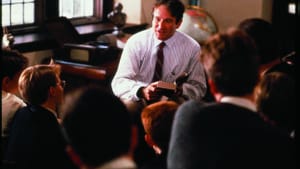Stay in the Loop
BSR publishes on a weekly schedule, with an email newsletter every Wednesday and Thursday morning. There’s no paywall, and subscribing is always free.
Robin Williams: Empathetic hero
Remembering Robin Williams (six)

I was out to dinner last night when the waiter darted up to the table to announce the news that Robin Williams was dead of an apparent suicide. He was one of my favorite actors and comedians. His vast and masterful output deserves a thorough treatment from film experts. As a layperson, I would like to focus on two of his movies that have guided my way of thinking for many years: Dead Poets Society and Good Will Hunting.
In both of these films, Williams plays mentoring roles, a teacher in the first and a counselor in the second. In these roles, he blended the thoughtful with the humorous. He didn’t just make people laugh, he made them think.
In Dead Poets Society, Williams plays the idealistic, unorthodox literature teacher John Keating, who encourages Neil Perry to pursue his dream of acting in spite of his father’s objections. Keating shows the boys pictures of alumni from many years previous. “Did they wait until it was too late to make from their lives even one iota of what they were capable?” he asks about the young men in the pictures. “Because, you see gentlemen, these boys are now fertilizing daffodils. But if you listen close, you can hear them. . . . Carpe diem. Seize the day, boys. Make your lives extraordinary.”
Keating was not out to make a class full of actors, but a society of freethinkers. He has three students take a stroll around the school courtyard while the rest of the class looks on. Each begins at his own pace, then they begin marching, while the class begins to clap in tempo. Keating observes that some students might think they would’ve walked differently, but quipped, “Ask yourselves why you were clapping.” Then he encourages all the students to walk around the courtyard in their own ways. One leans against a wall, exercising his right not to walk. “Thank you, Mr. Dalton, you just proved the point of the exercise,” the teacher says.
In a scene that is now all too real, Neil Perry kills himself after a confrontation with his father over his future, and an aggressive interrogation ensues that ends in Keating’s removal as a teacher from the school, his methods having been regarded as too dangerous. Even today, many would consider the message of this movie radical. The belief that you should take life by the throat and be your own person gets more lip service than actual assent, but I’m grateful to Robin Williams for making this idea irresistible.
In Good Will Hunting, Williams plays the counselor Sean Maguire, who is introduced to the eponymous protagonist played by Matt Damon, a janitor at MIT, after he is discovered solving a math problem in the hallway. Something of a sad widower, Maguire tries his best to deal with Will Hunting’s book-smart cynicism and troubled past while managing the expectations of Professor Gerald Lambeau, the teacher who discovered Will’s sharp intellect and is pushing him to be an overachiever.
Hunting has no idea what he wants to do with his life and has a snarky excuse for every suggestion that comes along. He finds fault with everything, such as a painting in Maguire’s office.
“It’s a real piece of shit,” he says.
“You know what the real bitch of it is? It’s paint by number!” Maguire counters.
After Will insulted his counselor in a meeting, Sean talks to him the next day while sitting on a park bench, pointing out the difference between what someone knows from a book and what can be learned from direct experience in life.
“So if I asked you about art, you'd probably give me the skinny on every art book ever written,” Maguire said. “Michelangelo. You know a lot about him. Life's work, political aspirations, him and the pope, sexual orientation, the whole works, right? But I bet you can't tell me what it smells like in the Sistine Chapel.”
In short, you couldn’t learn anything from Will Hunting that you couldn’t read in a book. With heroic patience, Sean Maguire helps Will to unveil his humanity, teaching him to open up and follow his true passions. In the end, Will leaves Boston and chases after the girl that he had pushed away earlier for fear of rejection.
When I think of the work of Robin Williams, I think of idealism, but not loftiness. It’s messy, like normal human beings. Nor is he an aloof analyzer of others. In many roles, he played an empathetic nurturer. Think of Mrs. Doubtfire or Awakenings. These are beautiful roles, ones worth remembering when we’re tempted to talk about what’s wrong with other people rather than help them.
It is hard to picture someone who brought so much happiness to his audiences reaching a point of such despair that he would end his life, but there isn’t much on Earth that seems logical, is there? In the end we can only remember him by seizing the day, following our passions, and making our lives as extraordinary as we can.
More remembrances by Rich Heimlich, Tom Hannigan, Maria Thompson Corley, Chris Predmore, Tara Lynn Johnson, Gary L. Day, Thom Nickels, and Armen Pandola.
Sign up for our newsletter
All of the week's new articles, all in one place. Sign up for the free weekly BSR newsletters, and don't miss a conversation.
